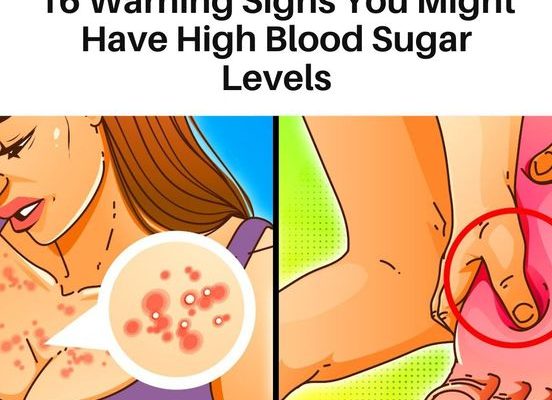High Blood Sugar Warning Signs
High blood sugar, often associated with diabetes, reveals warning signs well before diagnosis. With diets high in processed foods, awareness and education are crucial in detecting and addressing these indicators.
*Please, be aware that we DO NOT intend to provide medical advice. Any content in our materials is purely for informational purposes. We strongly suggest seeking healthcare professionals’ guidance.
1. Excessive Urination

Drinking excessive water before bed may cause nocturnal urination. However, high blood sugar can lead to urinary tract infections and increased urination.
2. Blurred Vision

Temporary blurred vision is often caused by high blood sugar, not a need for glasses. Swelling of the lens due to elevated glucose levels is the likely culprit.
3. Difficulty Concentrating

Insufficient insulin prevents glucose removal from the bloodstream, hindering body function. Fatigue, lack of focus, and dehydration may result from high blood sugar levels as the body tries to eliminate excess glucose through urination.
4. Dry Mouth

Elevated blood sugar levels lead to dryness in the mouth due to increased glucose in the bloodstream and saliva.
5. Impotence

This male-specific problem arises from inadequate long-term blood sugar regulation, resulting in nerve and blood vessel damage.
6. Recurrent Infections

Monitoring recurring infections and dysfunction of glands like the thyroid, adrenal, and pituitary is crucial. Be vigilant for pancreatic diseases and significant blood glucose elevation.
7. Slow Healing Wounds
Delayed healing of minor injuries may indicate high blood sugar levels. Nerve damage and reduced blood circulation hinder skin repair in affected areas.
8. Stomach Problems

Elevated blood sugar levels can cause delayed stomach emptying, resulting in bloating, abdominal pain, nausea, or vomiting.
9. Constant Fatigue

Low thyroid levels often lead to fatigue, sleepiness, and depression. Energy is needed to combat infections, causing constant exhaustion and elevated blood sugar levels.
10. Thirst
Elevated blood sugar levels put a strain on your kidneys, requiring them to work harder to filter and absorb excess sugar. This process necessitates increased fluid flow for sugar elimination through urine.
11. Dry and Itchy Skin
Itchy skin is often a result of inadequate blood circulation, with the lower legs being the most commonly affected area.
12. Always Hungry
While having a hearty appetite is normal for some, a lack of the hormone incretin can lead to increased hunger and faster emptying of food from the stomach, potentially raising blood sugar levels.
13. Excess Abdominal Fat
Feeling constantly hungry can indicate high blood sugar levels as the consumed food fails to provide sufficient energy to nourish your cells.
14. Nerve Problems
Elevated blood sugar levels can cause damage to the nerves oxygen and nutrient-carrying blood vessels, resulting in potential nerve complications.
15. Skin Changes
Discoloration and skin growths may indicate high blood sugar, including dark, thick patches on the neck and hands.
16. Tingling

Tingling and numbness in specific body areas may indicate high blood sugar and neuropathy, a type of nerve damage associated with it.
Do you suffer from high blood sugar? Let us know in the comments below.




